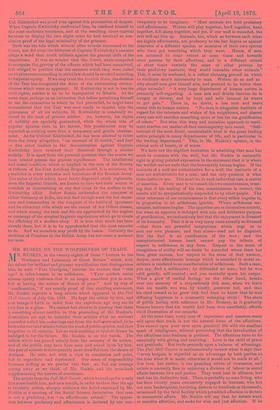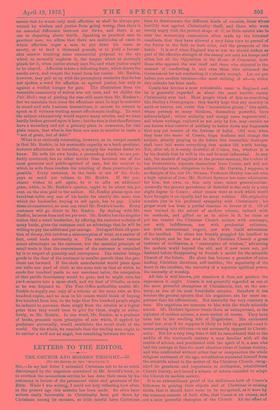MR. RUSKIN ON THE WOLFISHNESS OF TRADE.
MR. RUSKIN, in the twenty-eighth of those " Letters to the 1 Workmen and Labourers of Great Britain" which, with the talent for brilliant and piquant mystification that distinguishes him, he calls "Fors Clavigera," informs his readers that " this age" is infra-human in its selfishness. "Your modern social science openly confesses that it no longer considers you as men, but as having the nature of Beasts of prey." And by way of " confirmation," if not exactly proof of this startling statement, Mr. Ruskin reprints a long article which appeared in the Pall Mall Gazette of July 6th, 1868. He kept the article by him, and now brings it forth in order that the reprobate age may see its own face in a glass. We cannot but observe in passing that there is something almost terrible in this proceeding of Mr. Ruskin's. Journalists are apt to consider their articles what an eminent journalist called his,—shavings east from the well-worn mind, to be blown for one brief minute before the wind of public opinion, and then forgotten to all eternity. Let no such soothing or cynical dream be indulged in for the future. Mr. Ruskin is on the watch. The article which has passed utterly from the memory of its author, and of the public, may have been seen and seized upon by him. His pair of scissors is incomparably more dreadful than the shears of Atropos. He cuts, not with a view to conclusion and quiet, but to reproduce and reprimand. Our sense of responsibility becomes stifling as we ponder this fact ; we feel our courage oozing away as we think of Mr. Ruskin and his note-book supplementing the terrors of conscience.
The article from the Pall Mall Gazette, which he has kept for nearly five years beside him, and now recalls, in order to show that the age is brutishly selfish, sharply criticises the belief expressed by Mr. Ruskin at a meeting of the Social Science Association that man is not a predatory, bat " an affectionate animal." The opposi- tion between predatory and affectionate is declared by our con-
temporary to be imaginary. " Most animals are both predatory and affectionate. Wolves will play together, herd together, bunt together, kill sheep together, and yet, if one wolf is wounded, the rest will eat him up. Animals, too, which as between each other are highly affectionate, are predatory to the last degree as against creatures of a different species, or creatures of their own species who have got something which they want. Hence, if men are actuated to some extent at some times and towards some persons by their affections, and to a different extent at other times towards the same or other persons by their predatory instincts, they would resemble other animals." This, it must be confessed, is a rather alarming ground on which to vindicate man's inhumanity to man. Wolves do so and so why should man give himself airs, and pretend to be better than other animals ? "A very large department of human nature is primarily self-regarding. A man eats and drinks because he is hungry or thirsty, and he buys and sells because he wants to get gain." There is, no doubt, a leas sour and more sunny side to human nature. "No man is altogether destitute of regard for the interests and wishes of his neighbours, and almost every one will sacrifice something more or less for the gratification of others." But even this wary and tentative approach to senti- ment startles our matter-of-fact contemporary into recoil. "Self- interest of the most direct, unmistakable kind is the great leading active principle in many departments of life, and in particular in the trading department." This, in Mr. Ruskin's opinion, is the ethical code of beasts, or of worse.
We have not the slightest hesitation in admitting that man has much in common with the wolf, but Mr. Ruskin is eminently right in giving pointed expression to the statement that it is where the wolfish nature ends that the honourably human begins. If the instincts of a wolf are authoritative for a wolf, the instincts of a man are authoritative for a man ; and the only question is what those instincts are. This must be, in each individual case, a matter of assertion. Every man is to consult his own consciousness, trust- ing that if his reading of his own consciousness is correct, the results will be sympathetically responded to by other people. The clear utterance of our consciousness is that every selfish impulse is, in proportion to its selfishness, ignoble. Where selfishness ter- minates, nobleness begins. The appetites are in themselves neutral, but when an appetite is indulged with sole and deliberate purpose of gratification, we instinctively feel that the enjoyment is divested of its humanity. That it is in very many cases actually so divested —that there are powerful temptations which urge us to seek our own pleasure, and that alone—need not be disputed. But the fact is no justification of the fact ; and the unsophisticated human heart cannot pay the tribute of respect to selfishness in any form. Respect in the sense of recognition of ability will no doubt be conceded where there has been great success, but respect in the sense of that warmer, deeper, more affectionate homage which is accorded to moral ex- cellence is rendered to no manifestation of selfishness. Such a man, you say, died a millionaire ; he defrauded no man ; but he was cold, greedy, self-centred ; and you mentally spurn his corpse. What a glow of cordial feeling, on the other hand, breaks over our memory of a stupendously rich man, when we learn that his wealth was won by kindly, generous toil, and that his chief reward as he grew rich had been to know that he was diffusing happiness in a constantly enlarging circle ! The state of public feeling with reference to Mr. Brassey, as it gradually became known that his wealth had been won unselfishly, affords vivid illustration of our remarks.
At the same time, every man of experience and common-sense will agree that trade is not the natural home of the affections. You cannot open your eyes upon practical life with the smallest spark of intelligence, without perceiving that the introduction of the affections into business is perilous. The affections have to do essentially with giving and receiving. Love is the child of grace and gratitude. But trade proceeds upon a balance of advantage. The Pall Mall Gazette is mathematically correct when it says that " every bargain is regarded as an advantage by both parties at the time when it is made, otherwise it would not be made at all." Not love, but justice, is the presiding virtue of commerce, and nature is austerely firm in enjoining a division of labour in social affairs between love and justice. They work beat in alliance, but each has its distinctive task. There is probably no man living, who has been twenty years extensively engaged in business, who has not seen bankruptcies, involving distress to hundreds or thousands, occasioned by the fatal facility which permitted affection to dictate in commercial affairs. Mr. Ruskin will say that he detests weak or maudlin affection, and seeks for wise and just affection. If he means that he wants only such affection as shall be always pre- vented by wisdom and justice from going wrong, then there is no essential difference between our views, and there is no use in disputing about words. Speaking as practical men to practical men, we affirm that there are multitudes of cases in which affection urges a man to put down his name as surety, or to lend a thousand pounds, or to yield a favour- able answer touching some commercial proposal to the eye which so earnestly implores it, the tongue which so movingly pleads for it, when justice sternly says No, and when justice ought to be obeyed. Affection is here a deflecting force, which draws the needle awry, and tempts the vessel from her course. Mr. Ruskin, however, may pull us up with the peremptory reminder that he has not spoken a word for affection as against justice, but only as against a wolfish hunger for gain. The illustration from the venerable community of wolves was not ours, and we dislike the Pall Mall's way of putting the case still more than Mr. Ruskin's ; but we maintain that since the affections must be kept in restraint in sound and safe business transactions, it cannot be correct to speak as if virtuous trading meant affectionate trading. To treat the subject exhaustively would require many articles, and we have hardly broken ground upon it here ; but the sum is that the affections have a secondary and not a primary place in commerce, for this plain reason, that what is due from one man to another in trade is " not of grace, but of debt."
What is so curiously interesting, however, as to compel remark is that Mr. Ruskin, in his mercantile capacity as a book-producer, however affectionate in intention, is simply the hardest dealer we know. He sells his own books, a proceeding which, we are per- fectly convinced, has no other motive than becomes one of the most generous and public-spirited of men, but the manner in which he sells them renders the retailing of them practically im- possible. Every customer, in the trade or out of the trade, pays so much per volume to Mr. Ruskin. If the pur- chaser wishes to sell again, be is to affix an additional price, which, in Mr. Ruskin's opinion, ought to be about ten per cent. on the sum paid to the author. Mr. Ruskin places upon our breakfast-table any one of his books for exactly the same sum which the bookseller, buying to sell again, has to pay. Under these circumstances, no man can retail Mr. Ruskin's books. Every customer will go direct to Mr. Ruskin. By dealing with Mr. Ruskin, he saves time and ten per cent. Mr. Ruskin has the singular notion that a retail bookseller, by offering the customer a choice of many books, gives the customer such an advantage that he will be willing to pay the additional per-centage. But apart from all ques- tion of theory, this involves a misconception of what, as a matter of fact, retail trade universally is. The retailer confers various minor advantages on the customer, but the essential principle of .retail trade is that the convenience of the customer is consulted by it in respect of quantity and conveyance. The retailer brings goods to the door of the customer in smaller parcels than the pro- ducer can forward. If the cloth manufacturer would place upon our table one yard of cloth at the same rate as that at which he sends five hundred yards to our merchant tailor, the occupation of that pacific functionary would be gone, and he might turn his yard-measure into a spear-shaft, and try that of Othello, as soon as he was disposed to. The Post-Office authorities enable Mr. Ruskin to supply one copy of a volume at the same rate as five hundred copies, and no man in his senses would think of buying five hundred from him, in the hope that five hundred people might be induced to purchase them singly from the retailer at a higher price than they would have to give for them, singly or collec- tively, to Mr. Ruskin. In one word, Mr. Ruskin, as a producer of books, proceeds upon principles of sale which, if applied by producers universally, would annihilate the retail trade of the world. On the whole, we conclude that the trading man ought to be neither a wolf nor an angel, but something between the two.



































 Previous page
Previous page